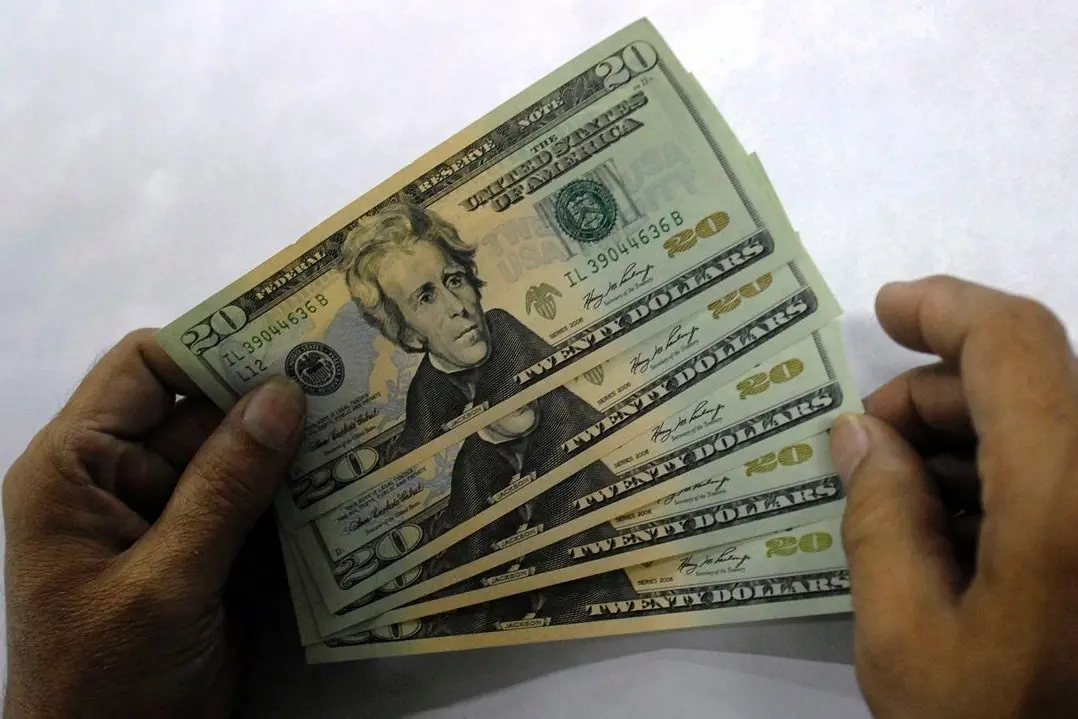PHOTO
- Dollar trades lower in Asian trade on the back of a stronger euro and global equities
- Oil prices dip again after Tuesday’s 6 percent fall
- Saudi, Dubai and Qatar stock markets rise, Abu Dhabi drops
The dollar was broadly lower in Asian trade on Thursday as demand for safe haven currencies dropped after a rebound in global markets and a stronger euro, on hopes for a resolution to Italy’s budget dispute.
The dollar index, which measures its value against six major peers, traded lower at 96.7 on Thursday. The index lost more than 0.1 percent of its value in the previous trading session. It has traded steadily over the past couple of days on fears over a global growth slowdown due to the United States-Sino trade conflict.
The euro gained marginally versus the dollar to trade at $1.1388. The currency gained 0.1 percent on Wednesday. Italian Prime Minister Giuseppe Conte had expressed concern about government bond yield spreads and pledged reforms.
The euro has risen in six out of the last seven sessions, according to a Reuters report on Thursday.
Oil prices
Oil prices dipped on Thursday, with U.S. West Texas Intermediate (WTI) crude futures trading at $53.38 per barrel at 0141 GMT, 0.5 percent, or 25 cents, below their last settlement.
Front-month Brent crude oil futures were at $63.28 per barrel, down 20 cents, or 0.3 percent, from their last close.
“U.S. inventory data ... continued to show significant supply builds, which comes on the back of sustained record U.S. crude oil production,” Stephen Innes, head of trading for Asia-Pacific at futures brokerage Oanda in Singapore, told Reuters.
The American Petroleum Institute announced in a report released late on Tuesday that the U.S. commercial crude inventories fell unexpectedly last week, going down by 1.5 million barrels, to 439.2 million.
Earlier on Tuesday, oil prices fell by over 6 percent following a drop in global stock markets and weakening sentiment over a potential global economic slowdown but it rose slightly on Wednesday by around $1 a barrel.
Global markets
Asian shares rose slightly on Thursday, although, like most global stock markets, remained affected by increasing U.S. interest rates and trade tensions.
MSCI’s broadest index of Asia-Pacific shares outside Japan added 0.2 percent, showing a better performance this month after previous three-month declines. But it is expected to end the year on its worst annual performance since 2011, mainly due to the weak outlook for corporate profits.
Data from regional stock exchanges showed foreigners has last month sold a total of $14.54 billion Asian stocks in Taiwan, South Korea, India, Thailand, Philippines, Indonesia, and Vietnam equities in October, according to Reuters.
Overnight in Wall Street, the benchmark S&P 500 stock index ended higher but near session lows.
“Markets experienced a better night last night, but it is fair to say that sentiment remains fragile,” Reuters said, quoting a note from analysts from ANZ, an Australian bank, to clients.
“There seems a greater appreciation that with the impact of U.S. fiscal stimulus waning, the U.S. economy could slow like other major economies have,” it added.
Middle East markets
On Wednesday, Saudi Arabia's index rose 0.1 percent, with Banque Saudi Fransi adding 1.9 percent, insurance group Medgulf gaining 5.7 percent and Tourism Enterprises Co rising 4.1 percent.
Saudi Industrial Export dropped 9.9 percent, continuing its six-day decline after stock speculators pushed it up by over 200 percent in early October.
The Dubai index was up 0.2 percent. Dubai Investments, a public investment company, added 2.8 percent.
Construction firm Arabtec rose 1.8 percent after saying it was progressing with the refinancing of its debt. However, Nasdaq-Dubai listed DP World lost 2.9 percent. An Indian regulator has ordered an investigation into alleged anti-competitive practices by the firm and Denmark's A.P. Moller-Maersk at the terminals they operate in Mumbai, Reuters reported on Tuesday, citing sources familiar with the matter.
Abu Dhabi's index lost 0.4 percent, with Abu Dhabi Commercial Bank dropping 1.5 percent, and Ras Al Khaimah Cement diving 8.9 percent. However, Abu Dhabi National Hotels surged 14.7 percent.
The Qatar index recovered from its last’s session biggest fall since August in adding 0.2 percent. Qatar National Bank climbed 1.9 percent and Masraf Al Raya bank rose 1 percent.
Precious metals
Gold prices were steady early on Thursday after hitting two week-record high in the previous session.
Spot gold was steady at $1,225.70 per ounce at 0123 GMT. Prices on Wednesday were the strongest since November 11 at $1,230.07 per ounce.
(Writing by Yasmine Saleh; Editing by Shane McGinley)
(yasmine.saleh@refinitiv.com)
Gain a deeper understanding of financial markets through Thomson Reuters Eikon.
Our Standards: The Thomson Reuters Trust Principles
Disclaimer: This article is provided for informational purposes only. The content does not provide tax, legal or investment advice or opinion regarding the suitability, value or profitability of any particular security, portfolio or investment strategy. Read our full disclaimer policy here.
© ZAWYA 2018





















